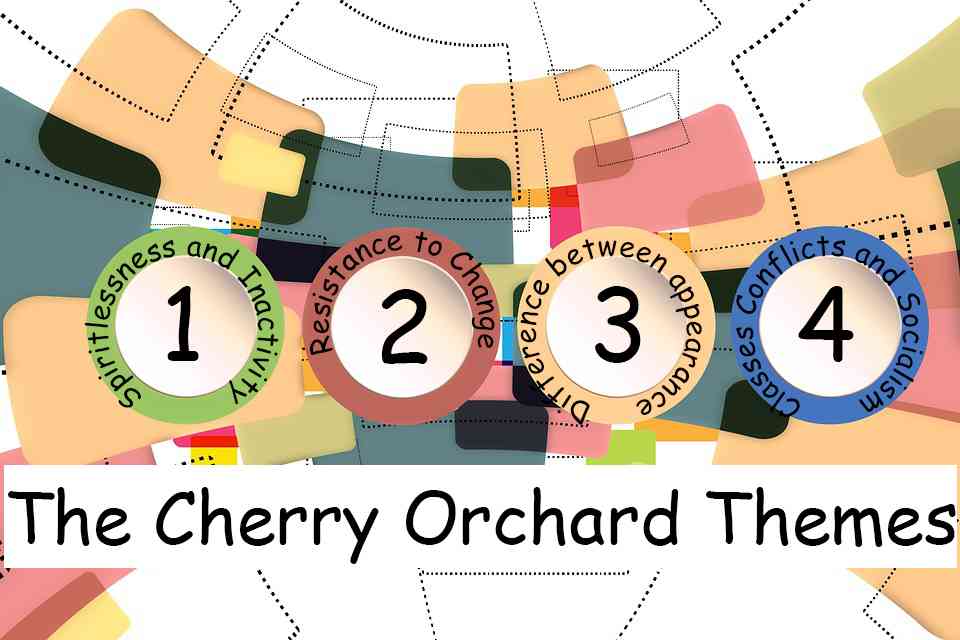The Cherry orchard depicts chain of events of a Russian elite family that does not able to prevent its loved Cherry Orchard from public sale and as a result ultimately it becomes one of the most important themes of this play. Symbolically, the play is more or less about the blossoming of the lower-class in Russia and portrays the tale of downfall of the elite class. At the end of play, we come to know that a servant, whose families were serfs, termed Lopakhin in the play, purchases the estate of a wealthy and well settled family.
“The Cherry Orchard” has been planned as comedy as writer of the play Anton Chekhov himself once said that the play is a comedy yet production of the play accentuates such occasions, from which we can finally conclude that it is not purely but partially a tragedy. Following are the major themes of “The Cherry Orchard”:
“The Cherry Orchard” Themes:

Spiritlessness and Inactivity:
It is among the most highlighted themes of “The Cherry Orchard”. It is not wrong to say that from start of the play to its end, this theme blows soul in the plot. We can remember dialogue of Mrs. Ranevsky when she addresses:
“If only this heavy load could be lifted from my heart; if only I could forget my past!”.
Meaning thereby that she is expecting a miracle, through which problems of her life should be solved but that never happens. She herself and her daughter along with her brother want to do nothing to change their condition and eventually their condition which becomes miserable with the passage of every single second. Attitude of Mrs. Ranevsky’s offspring, Leonid Gayev and even her stepdaughter’s attitude towards life and work is full of passivity as well as indolence. It has become a routine life for them to do nothing. It is because they have never done anything in their lives neither when they were teenagers nor when they become young and grew old.
The most prominent lady of the play, on whom the attitude of other characters is dependent, has intended not to do anything and to stop “The Cherry Orchard” from being auctioned. In this way, the play ends before climax because of the spiritlessness of Mr. Ranevsky.
Traditional Behavior of Mrs. Ranvesky:
Although we feel from her behavior that she is not doing anything to change her fate yet there is something which she is doing; she willfully and happily goes for classy dinners, gifts expensive things to her near and dear ones and even lends money to her neighbors knowingly that she herself is in debt. There is something further that she does very perfectly; she creates her own imaginary happiness, spending money on irrelevant things. She does not take precautionary measures even when her estate is going to collapse. It is another reason due to which she eventually falls from prosperity to adversity, which gives the play “The Cherry Orchard” an important theme, which must be added at first in the list of themes of “The Cherry Orchard”.
Resistance to Change:
Difference between appearance and reality : | Best Themes of “The Cherry Orchard”:
Freewill and results:
Classes Conflicts and Socialism as Themes of “The Cherry Orchard”:
In addition, some other prominent themes of The Cherry Orchard are disclosed when Mr. Ranevsky feels that there is no way to get rid of this problem and her family could not be able to find any path to survive in changing atmosphere of Russia. New emerging social class of Russia such like Lopakhin finds new ways of earning profit and always searches for inner satisfaction even from those who once ordered people like Lopakhin to work.
